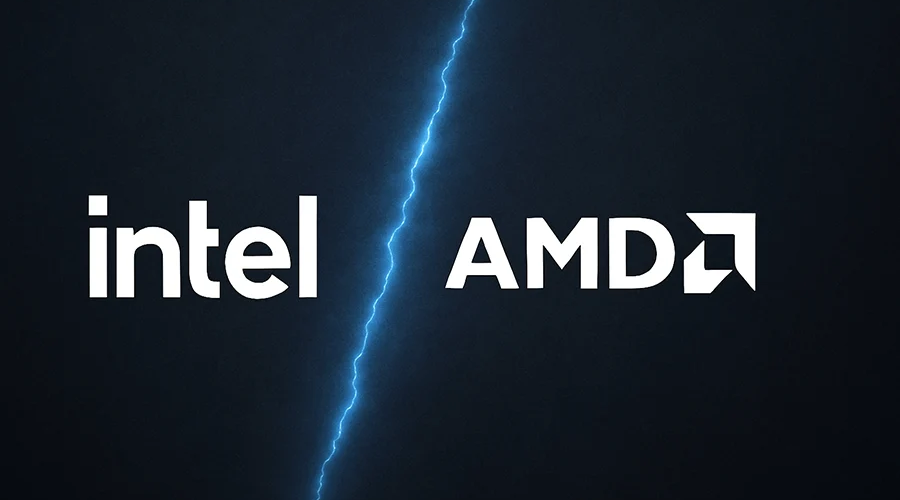Intel vs AMD: Which Processors Are Businesses Choosing in 2025?
In the ever-evolving world of technology, the processor war between Intel and AMD remains as competitive as ever. While both companies have made massive strides in performance, efficiency, and value, the question for businesses in 2025 still stands: Which processor brand is the better choice for business needs? At ICTECH Distribution, we help companies across the Middle East and Africa find the right IT solutions. Let’s break down the essential factors to help you make an informed decision.
1. Intel vs AMD: A Market Overview in 2025
Intel, the longtime leader in the processor space, has faced serious competition in recent years from AMD. For decades, Intel dominated desktops, laptops, and server markets with its tried-and-tested performance. However, AMD’s Ryzen and EPYC processors have changed the game since their introduction, offering high-core count CPUs at lower costs with impressive multitasking capabilities.
In 2025:
- Intel still holds the lead in overall market share, especially in enterprise and data center deployments.
- AMD, however, continues to gain ground in SMBs, creative industries, and cloud deployments, especially with its EPYC line and Ryzen 7000 series.
2. Performance & Multitasking: What’s Better for Business?
AMD:
- The Ryzen 7000 series and EPYC Genoa chips now lead in multi-core benchmarks, making them a favorite in render farms, video editing, CAD, and virtualization-heavy environments.
- With up to 96 cores in EPYC CPUs and powerful Ryzen 9s available for desktops, AMD shines in environments where parallel processing is a must.
Intel:
- Intel’s 14th Gen Core and Xeon Scalable CPUs remain unbeatable in single-threaded performance, which is crucial for most standard office apps, finance software, and web workloads.
- With better hybrid architecture (P-cores and E-cores) and Intel Thread Director, these CPUs are now smarter at managing active vs background tasks.
In summary: If your business needs heavy multitasking and creative workloads, AMD is your friend. For general office tasks or systems with light workloads, Intel might serve better.
3. Energy Efficiency & Thermal Performance
AMD:
- Thanks to TSMC’s 5nm and 6nm architecture, modern Ryzen and EPYC chips are far more efficient than their predecessors.
- Although AMD chips ran hotter in the past, 2025 models include auto thermal throttling, improved boost behavior, and better support for low-power states.
Intel:
- Intel has improved its energy profile in newer generations. Its Intel 7 process (enhanced 10nm) in business CPUs balances cooler performance at idle and under light loads, making it ideal for offices running PCs 24/7.
Winner: Tie — AMD is efficient under load, Intel is cooler at idle. Your decision should depend on workload type.
4. Cost, Value & ROI
AMD:
- Provides better core-per-dollar value, especially for Ryzen 5 and 7 CPUs.
- Great for startups or SMEs looking to maximize performance on a limited budget.
- Lower total cost of ownership when it comes to multi-threaded workloads.
Intel:
- More expensive on the high-end, especially Core i9 and Xeon Platinum lines.
- However, Intel’s stability and lower power use can reduce operational costs in long-term deployments.
Example:
- AMD Ryzen 9 7900X (12-core) might cost 20–30% less than Intel i9-13900K with comparable multi-threaded output.
- But Intel i5-14600 could outperform Ryzen 5 7600X in office-use scenarios.
5. Product Line Breakdown
| Brand | Entry-Level | Mid-Range | High-End | Server/Workstation |
|---|---|---|---|---|
| AMD | Ryzen 3 | Ryzen 5 / 7 | Ryzen 9 / Threadripper | EPYC Series |
| Intel | Core i3 | Core i5 / i7 | Core i9 | Xeon Scalable |
Business Use Cases:
- AMD Ryzen 5 / 7: Best for budget workstations, light content creation.
- Intel i5 / i7: Great for office suites, browsers, ERP, and general productivity.
- Ryzen 9 / Threadripper: For video production, 3D modeling, scientific computing.
- Intel i9 / Xeon: Ideal for virtual machines, finance servers, engineering.
6. Compatibility & Upgradability
AMD:
- Backwards-compatible socket AM4 supported across multiple generations, offering smooth upgrade paths.
- Latest AM5 platform provides DDR5, PCIe 5.0, and USB4 — ideal for future-proofing.
Intel:
- Changes sockets more frequently (e.g., LGA1700 for 12th to 14th Gen only), which can limit upgradeability.
- But offers more support for legacy systems, which is crucial for businesses upgrading old setups.
Note: AMD's long-term platform support is loved by small business owners trying to avoid frequent hardware refreshes.
7. Cloud and Enterprise Workloads
AMD EPYC (2025):
- Gaining major traction in hyperscale data centers.
- Powers backend servers for giants like Microsoft Azure and Google Cloud.
- Higher memory bandwidth, up to 128 PCIe lanes, and better cost-per-core.
Intel Xeon:
- Still preferred in banking, government, and high-security sectors due to robust hardware-based security (SGX, TME).
- Offers more OEM support, driver stability, and vendor-certified configurations.
Best for Cloud Deployments: AMD EPYC
Best for Traditional Enterprise: Intel Xeon
8. What Are Businesses Choosing in 2025?
Here’s what we’re seeing among our clients at ICTECH Distribution:
- Creative Studios & Marketing Agencies: Favoring AMD Ryzen 9 / Threadripper due to multitasking and rendering speed.
- Corporate Offices / SMEs: Sticking with Intel i5 / i7, for solid compatibility and simplicity.
- Cloud Providers: Shifting towards AMD EPYC for cost-effective scalability.
- Financial & Legal Firms: Preferring Intel Xeon due to long-term support and security features.
Final Thoughts: Which Should YOU Choose?
Go with AMD if:
- You need better multitasking and multi-core workloads.
- You're building new systems and want best value for money.
- You run resource-heavy apps (rendering, compiling, virtualisation).
Go with Intel if:
- Your workflow is light and depends on single-threaded apps.
- You're upgrading legacy systems and need compatibility.
- You want stable, long-term deployments with great thermal efficiency.
About ICTECH Distribution
At ICTECH Distribution, we’re more than just an IT hardware supplier — we’re your growth partner. Based in Dubai, we’ve become one of the most trusted B2B IT product distributors across the Middle East and Africa. With a strong global supply chain, we provide:
- High-volume stock availability
- Unbeatable prices
- Dedicated account managers
- Expert recommendations on Intel, AMD, and other hardware ecosystems
Whether you're a startup setting up your first office or a global enterprise expanding your data centers, we have the right processor, system, and support for your success.


